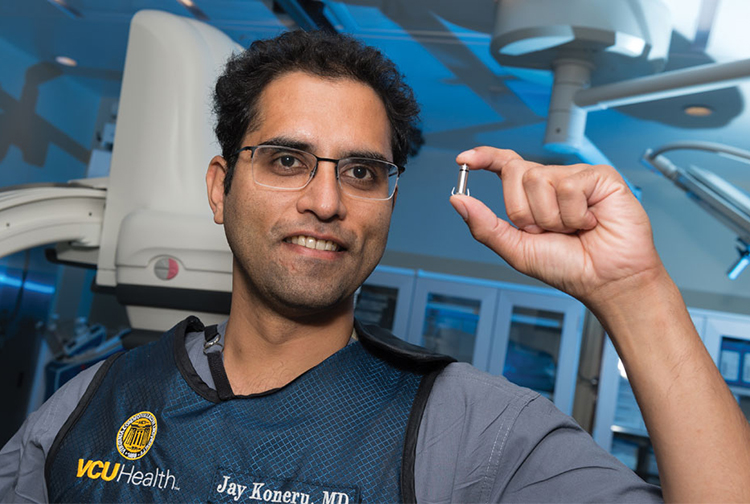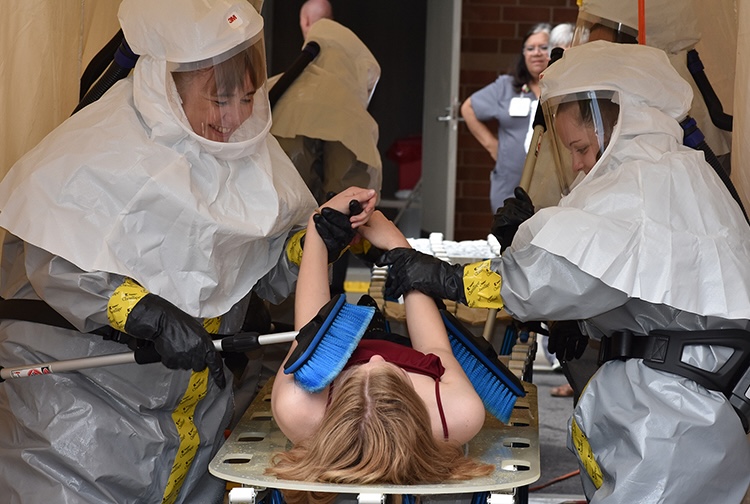
When to go to the doctor for heart palpitations
VCU Health Community Memorial Hospital electrophysiologist shares the lifestyle risks and underlying causes to keep your heart healthy.
September 25, 2023 Jayanthi Koneru, M.D., a Cardiologist and a Cardiac Electrophysiologist at VCU Health Community Memorial Hospital, holds a leadless pacemaker, a new type of pacemaker without any wires in the heart. (VCU Enterprise Marketing and Communications)
Jayanthi Koneru, M.D., a Cardiologist and a Cardiac Electrophysiologist at VCU Health Community Memorial Hospital, holds a leadless pacemaker, a new type of pacemaker without any wires in the heart. (VCU Enterprise Marketing and Communications)
By Kristy Fowler
While it’s common to describe your heart as “skipping a beat” when falling in love, cardiologists recommend you get your heart checked out if that happens. Heart palpitations are an uncomfortable sensation of people noticing their heart beating, which could be the sign of a heart condition.
These heart conditions are regularly diagnosed across the country. The Centers for Disease Control and Prevention estimates that 12 million people in the United States will develop one of the most common types of irregular heartbeats — atrial fibrillation — by 2030.
“One in four adults in the U.S. will develop irregular heartbeats,” said Jayanthi Koneru, M.D., a cardiologist at VCU Health Community Memorial Hospital whose clinical expertise includes the entire gamut of clinical electrophysiology. “Regular exercise, appropriate sleeping habits and certain types of yoga are key lifestyle modifications for heart health. 150 minutes of moderate exercise per week is known to decrease adverse cardiovascular outcomes in the long-term.”
Koneru is actively involved in clinical trials of investigational mapping technologies for atrial fibrillation. He shared his insights on this common health condition and how to keep your heart healthy.
Why do heart palpitations occur?
Palpitations could be random blips but are due to one or two skipped heartbeats, extra heartbeats or premature heartbeats which disturb the cadence of the normal rhythm. They can originate either from the upper or lower chambers of the heart.One of the most common types of irregular heartbeats or arrhythmias is atrial fibrillation, commonly known as AFib, where the upper and lower chambers of the heart are not synchronized during contractions.
They can be triggered by a variety of things, including stress or an underlying heart condition. Occasionally they do not have any triggers other than on a cellular level, which the individual is not able to control either by dietary discipline or stress reduction.
What are some lifestyle choices that can cause heart palpitations?
Some elements of your diet can cause heart palpitations, such as excessive caffeine intake or dehydration, having an electrolyte imbalance, food sensitivities or excessive alcohol use. Other contributing factors include low blood sugar, excessive snoring, unrefreshing sleep, sleep apnea, and an inactive lifestyle.What other conditions or medical emergencies can irregular heartbeats be a symptom of?
Abnormal heart beats can also be caused by other health conditions, including low or high blood pressure, hyper or hypothyroidism, anemia, heart attack, coronary artery disease, cardiomyopathy, diabetes, stress or anxiety, and long COVID-19, which is still being studied.At what point should someone seek medical care for an irregular heartbeat?
In general, if you have any kind of palpitations lasting 30 seconds or longer you should consult with your primary care physician as well as a cardiologist. Palpitations could be benign, a serious condition or a harbinger of a very serious systemic problem. Sometimes expressing concerns can also lead to early diagnosis and prevention of stroke especially in the case of atrial fibrillation.Sign Up for VCU Health Community Memorial Hospital’s E-Newsletter



